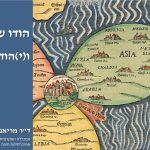Jews who practice Buddhism (Jubus) have been studied for years, primarily in the United States… but what about religious Jews in Israel?! This study seeks to shed light on their modes of coping with the potential tension inherent in this syncretic combination.
The lecture was presented at the 8th annual conference of the Israeli Association for the Study of Religions (IASR), held at Bar-Ilan University on May 15, 2025. The conference focused on the theme “Dialogue: Within Religions and Outside Religions,” as part of a session titled “External Dialogue – Internal Dialogue.”
This presented research is based on a master’s thesis written at the University of Haifa.
Abstract
The portmanteau syncretistic identity marked as “Jubu” (a fusion of Jewish and Buddhist) has existed in the West for several decades, primarily in North America. In Israel, it has become known mainly among “secular” sectors. However, it turns out that even religious Jews in Israel incorporate Buddhist practices into their daily lives, as religious/spiritual acts.
For many years, Judaism was regarded as an exclusivist religion, and any integration of belief or practice originating from outside it was perceived as strictly forbidden—idolatry (lit. “avoda zara”). Yet in recent decades, under the influence of alternative spiritualities, the map of spiritual-Jewish-religious identities in Israel has undergone processes of change and flexibilization, adopting a syncretistic approach that encourages the integration of practices from various traditions. Nevertheless, the voluntary integration of Buddhist practice as a religious/spiritual act by religious Jews is not a trivial choice. This study seeks to examine the ways in which religious Jewish Israelis who engage in Buddhist practice cope with the potential tension inherent in this choice.
We analyzed twelve semi-structured in-depth interviews conducted with these religious JuBus, and identified the strategies they employ to reduce the potential tension that may arise from incorporating Buddhist practices into their lives. We identified three main strategies: (a) independently filtering out elements of Buddhist practice perceived as “idolatrous”; (b) focusing the Buddhist practice on its experiential-psychological dimension; and (c) utilizing Buddhist practice in the service of Jewish practice.
The interviewees expressed a desire to engage in authentic Buddhist practice (while avoiding what they viewed as the negative label of “New Age”) and therefore preferred to practice Buddhism within frameworks that explicitly acknowledged its religious roots, rather than in settings that obscured them. They maintained their identity as Jews while seeking a middle ground between full openness to other religious traditions and religious exclusivism that rejects the adoption of any foreign practice. Their position may be understood as an instance of “dialogical particularism”—that is, a perception of Jewish identity as particularistic (seeing the Jewish tradition as unique and preferable), while simultaneously engaging in dialogue with another tradition through selective integration.
Beyond the specific case study, this research illuminates how the map of Jewish identities is undergoing transformation and reconfiguration in the present. It explores the modes by which individuals preserve connection to their inherited tradition while remaining open to inspiration from other traditions—employing strategies of adaptation for the purpose of integration.
Here is the video of the lecture (and thanks to Natalia Groisman for editing it!):
Lecturers
Marianna Ruah-Midbar Shapiro
Carmel Raz
Links
To download the full conference program (in Hebrew) – click here.
To view the abbreviated conference program (in Hebrew) – click here.
To download the call for papers (in Hebrew) published prior to the conference – click here.
To download the lecture abstract (in Hebrew) – click here. [See English abstract on this webpage.]
To visit the website of the Israeli Association for the Study of Religions (the website is mostly in Hebrew)- click here.
Date
15/5/2025
Language
Hebrew
Academic/Non-academic
Academic item
Bibliographical citation
For a citation, it’s best to refer to one of the articles that are to be published in the framework of this research project.





















